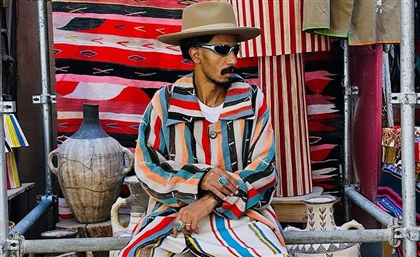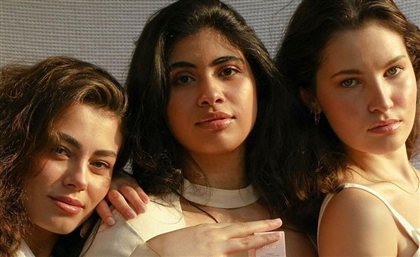What’s in a Name: Egyptians Recount How They Got Theirs Changed
The hottest new trend in town? CHANGING YOUR NAME! Staff writer Heba Radi finds out why thousands of young Egyptians are suddenly in hot pursuit of a brand new identity.

Birth; one of the most beautiful (and mortifying) displays of the human experience, where life courses for the first time in your brand-spanking new form. It’s all wonder and whimsy up until you’re handed to your parents for them to lay down the verdict on what they should call you.
Welcome to the world, Mekhemar.
Fast forward a few years till you’re of legal age, having surpassed a lifetime of misery, torment and a few spitballs because your name immediately evokes two things; pickles, and being extremely punchable. You decide to try and change your name, and you’re (forgivably) dumfounded at how you would even go about changing your own name. Luckily for you, Mekha, we’ve gone ahead and talked to a few folks who managed to figure out how to legally change their names, and it’s not as much of a hassle as your pickle brain thought it would be either.
In (kind of) the Nick of Time
Our first foray into identity change was with Esraa, who told us about her early life experience; “My name used to be Naema, after my aunt who had passed away, but I used to get picked on a lot because of it, and before I went to school, I insisted that I get my name changed because I just couldn’t handle it. I was a kid back then, and whining was what I did best.” Bold strategy, Esraa, then what? “My father agreed to it, after he felt that there was nothing we could do to dissuade people from picking on me, and of course my own insistence. He had asked me what I’d wanted to be called, and I said Esraa, and that was that.”
Naturally, our curiosity got the best of us, and we had to ask why she picked Esraa out of all the possibilities; “It was my childhood friend’s name, and she was the only one who didn’t make fun of me or my name back then. We grew up together, and she stood by me through everything, even my marriage, and she still does. I owe her everything, even my name.” Holy shit that was way too emotional, our writer didn’t expect that and took about 3 minutes to recover (for realsies). Before we wrapped up, Esraa managed to impart another gem on us; “FYI, my father is the only person out there who still calls me Naema.”
I used to get picked on a lot because of it, and before I went to school, I insisted that I get my name changed because I just couldn’t handle it.
Wouldn’t you believe it, the same thing happened to Fady, another game-changing name-changer (low hanging fruit), with only a few slight differences; his father had named him Fathy, after his own father (so that makes OG Fathy Fady’s grandfather). Grandpa Fathy passed away when daddy Fathy was just two years old, so naturally, the family was kind of at odds with that specific name (circumstances and whatnot), but nobody would dare trample on daddy Fathy’s most sacred of grounds. That remained to be the case for a while, up until one of Fathy junior’s friends called and asked if he could speak to “Fady.”.
“Fady? WTF?” is what we assume Fady senior had said on the phone, seeing as how there wasn’t a Fady to be found in the household, senior later discovered that everybody called his son “Fady,” so he had to change his son’s name, very much begrudgingly.
Change at a Ripe Old Age
Alright, we get how kids can get their names changed often, but somebody a tad older? That was the case when we met Hamida, who wasn’t exactly perturbed by her parents’ choice of name, up until she turned 25, when she decided to change it to Habiba. She stood by her decision much to the chagrin of her parents, eventually buckling and going to court to get Habiba bona fide. Things were a lot easier for Habiba (Hamida? Hamiba.) seeing as how she had her parents’ approval, and it just so happened to be among a list of names that makes it easier for a judge to approve, names the likes of Nafisa, Set el-Dar, and so on and so forth.
Some Names are on Egypt and Saudi’s Blacklist
The names we’d come across were pretty bog-standard, until we crossed paths with “Abdel-Naby,” who wanted to go on an Umrah in Saudi Arabia, and he (pretty nonchalantly) thought it wasn’t a big deal. Little did he know that Saudi has their own little list of names forbidden from entering the country, names such as Abdel-Naby (bummer), Abdel-Aaty, Malaak, Tabarok and so on. So, he had to change it to Abdullah just so he could be able to go, and he managed to do it just fine.
As it stands, Egyptian law prohibits the use of certain names following a similar vein; names like Abdel-Sayyed, Abdul-Rasul and Abdel-Naby.
Saudi has their own little list of names forbidden from entering the country, names such as Abdel-Naby (bummer), Abdel-Aaty, Malaak, Tabarok and so on.
Courts Refuse to Change Islamic Names
That was honestly kind of a surprise to find out; names like Khadeeja, Aisha, Mohammed and Fatima aren’t eligible for name change. The thing about that is how the personal status law is largely derived from Islamic law (or Sharia if you’re into that sort of thing), which means that if you just so happen to be called Mohammed and are Muslim (go figure), why would you need to change your name? Hmmmm? So courts just flat out refuse to change your name if that’s the case, unless you have an incredibly believable argument against their ruling; if your name is causing you an insurmountable amount of distress, only then can they be swayed.
That, unfortunately, was what Enaam was afraid of when we spoke to her; “A lot of people used to just call me “Anaam,” but that’s now how it’s spelt, and I tried confincing my parents to change it not just because of the nuisance, but also a bunch of practical problems when it came to my job; nobody knew how to read it, especially if you write it in English (we can attest to that). My father wasn’t convinced by my arguments, however, and had to consult a friend of his who happened to be a language specialist, who managed to convince my father that Enaam somehow translated to the plural form of animal.” Well great, what did you change it to? “It’s Hala now, and if you were to ask why I picked that one specifically, it’s my mother’s name. She was shocked when she found out I picked her name to be my new name, after a slew of arguments about which name to take. I didn’t want to get used to a new name all over again, so I just picked a name I loved, and at the same time, it’s familiar to me. So I went to the civil registry and legally changed it to Hala, and after a month and a half, I took the courts endorsement from the registry and managed to extract a new birth certificate and a new ID.”
My father wasn’t convinced by my arguments, however, and had to consult a friend of his who happened to be a language specialist, who managed to convince my father that Enaam somehow translated to the plural form of animal.
Is it Truly an Ordeal?
Though it might sound like a horrific bureaucratic nightmare, it’s a lot less daunting than you think it is. For a child between one day to seven years, all you need to do is head to your area’s civil registry with your son’s birth certificate as well as your marriage certificate and you (and your spouse’s) IDs, as well as a passport voucher. You fill in a few forms, write up a name change endorsement from your civil registry’s administrator and that’s your part of the process done for. It’s up to the civil registry to send your paperwork over to the civil status department which, in turn, send the paperwork to the relevant court to issue a ruling on your child’s name change. This whole process takes something like two to three weeks, maybe even a month, and your new info goes straight back to your civil registry. You take the relevant form from them and go to the civil status department to get your kid a new birth certificate. Not that bad for only two trips, yeah?
What if you’re older though? Of legal age? Crispy on the outside but still very much tender on the inside? It’s actually kind of simpler. Head to your civil registry with the required paperwork; birth certificate, ID, your educational qualification, your parents’ marriage certificate and a copy of their ID’s. You submit a request to the registry with the relevant info and the rationale behind why you’re changing names, heading straight to court afterwards. After a while, you head back to the registry to ask about your endorsement from court, if everything is in order, you take your endorsement and use it to extract the necessary official papers (the ones that have your old name) and any other official paperwork you need later.
This whole “ordeal” isn’t really much of a bother. All it takes is a bit of time and a smidgen of effort, but it’s not difficult, and it’s definitely worth the effort you put in. So get a move on, Mekhemar.
Translated from elfasla by Ahmed Ikram.
- Previous Article Dr.Sisilove or How (Not) To Diffuse A Bomb
- Next Article Youtube Launches its First Content Creation Space in the Middle East
Trending This Week
-
Apr 13, 2024
























